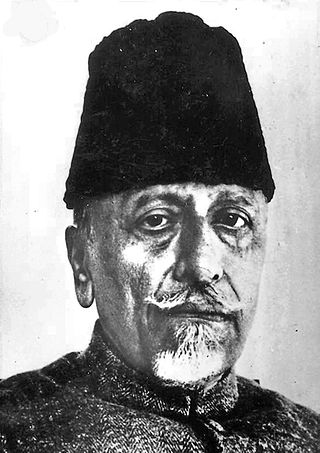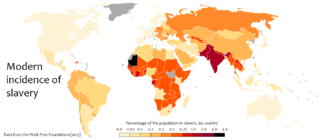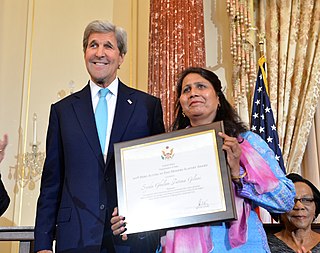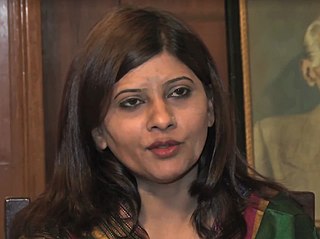Related Research Articles

Debt bondage, also known as debt slavery, bonded labour, or peonage, is the pledge of a person's services as security for the repayment for a debt or other obligation. Where the terms of the repayment are not clearly or reasonably stated, or where the debt is excessively large the person who holds the debt has thus some control over the laborer, whose freedom depends on the undefined or excessive debt repayment. The services required to repay the debt may be undefined, and the services' duration may be undefined, thus allowing the person supposedly owed the debt to demand services indefinitely. Debt bondage can be passed on from generation to generation.
Free the Slaves is an international non-governmental organization and lobby group, established to campaign against the modern practice of slavery around the world. It was formed as the sister organization of Anti-Slavery International but has since become a separate entity and has no relationship with it. The organization was created as a result of research done by Kevin Bales in his book, Disposable People: New Slavery in the Global Economy.

Abul Kalam Ghulam Muhiyuddin Ahmed bin Khairuddin Al-Hussaini Azad ; 11 November 1888 – 22 February 1958) was an Indian independence activist, writer and a senior leader of the Indian National Congress. Following India's independence, he became the First Minister of Education in the Indian government. He is commonly remembered as Maulana Azad; the word Maulana is an honorific meaning 'Our Master' and he had adopted Azad (Free) as his pen name. His contribution to establishing the education foundation in India is recognised by celebrating his birthday as National Education Day across India.

Iqbal Masih was a Pakistani Christian child labourer and activist who campaigned against abusive child labour in Pakistan.

The Human Rights Commission of Pakistan (HRCP) is an independent, democratic non-profit organisation. Founded in 1987, it is one of the oldest human rights organisations in the country.

The situation of human rights in Pakistan is complex as a result of the country's diversity, large population, its status as a developing country and a sovereign Islamic democracy with a mixture of both Islamic and secular law.

Bihari Muslims are adherents of Islam who identify linguistically, culturally, and genealogically as Biharis. They are geographically native to the region comprising the Bihar state of India, although there are significantly large communities of Bihari Muslims living elsewhere in the subcontinent due to the Partition of British India in 1947, which prompted the community to migrate en masse from Bihar to the dominion of Pakistan.
Kamaiya and Kamlari were two traditional systems of bonded labour practised in the western Terai of Nepal. Both were abolished after protests, in 2000 and 2006 respectively.
Shantha Sinha is an Indian anti-child labour activist. She is the founder of Mamidipudi Venkatarangaiya Foundation, popularly known as MV Foundation, and is a professor in the Department of Political science in Hyderabad Central University. She headed the National Commission for Protection of Child Rights for two consecutive terms ; The National Commission for Protection of Child Rights (NCPCR) was set up in March 2007 under the Commission for Protection of Child Rights Act, 2005, an Act of Parliament. Sinha was its first chairperson. She was awarded the civilian honour of Padma Shri by the Government of India in 1998.

Sunitha Krishnan is an Indian social activist and chief functionary and co-founder of Prajwala, a non-governmental organization that rescues, rehabilitates and reintegrates sex-trafficked victims into society. She was awarded India's fourth highest civilian award the Padma Shri in 2016.
Arfana Mallah is a Pakistani Human rights activist, leader of the Women's Action Forum and a professor of Chemistry at the University of Sindh, Jamshoro, Sindh, Pakistan.
The Hyderabad State Congress was a political party in the princely state of Hyderabad that sought civil rights, representative democracy and the union of Hyderabad with the Republic of India. It opposed the autocratic rule of the Nizam of Hyderabad and the militancy of the Razakars. HSC was formed in 1938.
The Indian Slavery Act, 1843, also known as Act V of 1843, was an act passed in British India under East India Company rule, which outlawed many economic transactions associated with slavery.

Debt bondage in India was legally abolished in 1976 but remains prevalent due to weak enforcement by the government. Bonded labour is a system in which lenders force their borrowers to repay loans through labor. Additionally, these debts often take a large amount of time to pay off and are unreasonably high, propagating a cycle of generational inequality. This is due to the typically high interest rates on the loans given out by employers. Although debt bondage is considered to be a voluntary form of labor, people are forced into this system by social situations.

Backward Society Education (BASE) is a nonprofit non-governmental organization that works with Tharu in Western Nepal to fight illiteracy, bonded labor from the Kamaiya system, and a number of other issues in the region. The group received the 2002 Anti-Slavery Award from the Anti-Slavery International for its work in combating bonded labor, and the Danish International Development Agency reported in 2002, "BASE is running the only literacy campaign in the country." They are currently working on initiatives to help people who have been freed from bonded labor.

Syeda Ghulam Fatima is a Pakistani human and labour rights activist, known for her work in ending bonded labour in brick kilns, and is General Secretary of Lahore-based Bonded Labour Liberation Front Pakistan (BLLF).

The Blood Bricks Campaign is an international campaign that focuses on fighting against the use of modern slavery in the Indian bricks kiln industry, while also exposing companies that use blood bricks in their supply chain. It was launched in 2014 by multiple, different organizations including Union Solidarity International (USi), Prayas, Action Aid Association, War on Want, and Thompsons Solicitors. This campaign's objectives include supporting unionizing efforts by workers, applying pressure to state and federal governments to enforce or amend laws, identifying companies that use bricks from bonded or forced labour, and bringing attention to the working conditions in the brick industry in India, as well as other parts of the world.

Krishna Kumari Kohli, also known by the nickname Kishoo Bai, is a Pakistani politician who has been the member of the Senate of Pakistan since March 2018. She is the second Hindu woman to hold this position. She is known for her campaigns for women's rights and against bonded labour; and was named as one of the BBC's 100 most influential women in 2018.

Composite nationalism is a concept that argues that the Indian nation is made up of people of diverse cultures, castes, communities, and faiths. The idea teaches that "nationalism cannot be defined by religion in India." While Indian citizens maintain their distinctive religious traditions, they are members of one united Indian nation. Composite nationalism maintains that prior to the arrival of the British into the subcontinent, no enmity between people of different religious faiths existed; and as such these artificial divisions can be overcome by Indian society.
Pushpa Kumari Kohli is the first Hindu woman to become a police officer in Pakistan. She was posted as Assistant sub-inspector of police (ASI) in Sindh province after she passed the provincial competitive examination through Sindh Public Service Commission.
References
- ↑ "Women activists stress need for transformative feminist leadership". The Nation. November 21, 2015. Retrieved 8 December 2016.
- 1 2 3 4 "Veeru Kohli: From bonded labourer to election hopeful", Dawn.com, 24 April 2014.
- 1 2 3 A brick-solid activist, Express Tribune, 13 Dec 2015
- ↑ "Log in or sign up to view". m.facebook.com. Retrieved 2023-10-31.
- ↑ Repila, Jacky (4 July 2013). "Veeru Kohli – the ultimate outsider". Oxfam. Retrieved 8 December 2016.
- ↑ Green, Duncan (23 July 2013). "Women's Leadership Groups in Pakistan – Some Good News and Inspiration". World Bank. Retrieved 8 December 2016.
- ↑ Mehmood, Rabia (21 September 2014). "Home of the Free: Starting a New Life in Pakistan's Azad Nagar, A Colony of Ex-Slaves". Aljazeera America. Retrieved 8 December 2016.
- ↑ Free the Slaves
- ↑ "The former bonded labourer who took on the Bhuttos".